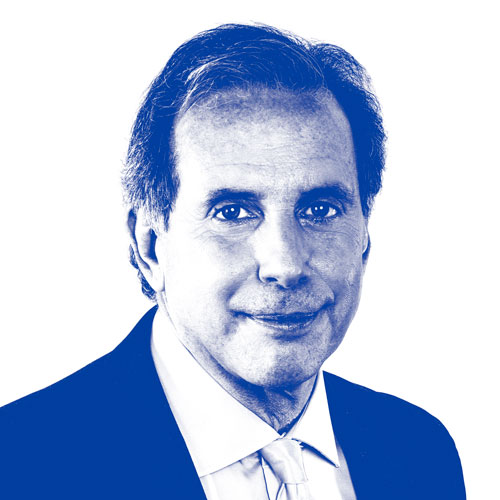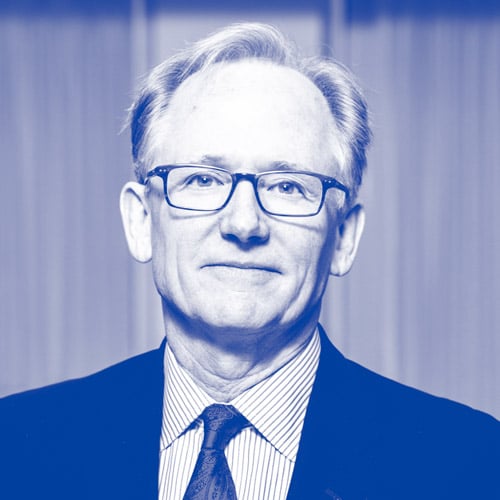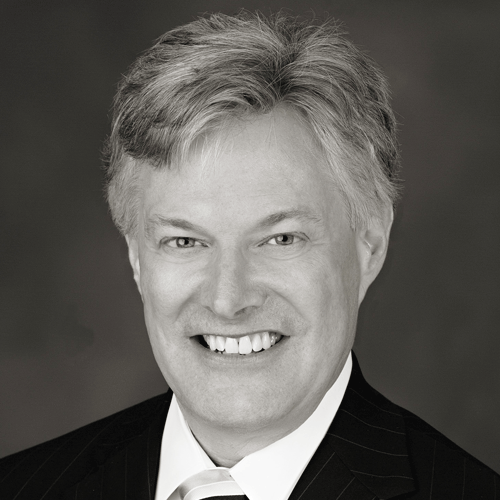Joe Salvo does not have a favorite Muppet. That’s what he says, anyway. As a father of five, he understands that he can’t play favorites. “It’s very important that they all feel equally loved,” Salvo adds. He will neither confirm nor deny rumors that he has a particular attachment to Cookie Monster.

For Salvo, Muppet favoritism is a professional hazard. Photos of eight Muppets adorn his office walls at Sesame Workshop, formerly known as Children’s Television Workshop, where he is executive vice president and general counsel. Founded in 1968 by television producer Joan Ganz Cooney, the nonprofit Sesame Workshop is devoted to developing educational media to prepare young children for school. The Workshop is best known for its flagship program Sesame Street, a public television mainstay that has entertained and educated three generations of young children in the United States and around the world.
One of Salvo’s first major tasks reached fruition last fall when the Workshop announced a five-year deal with HBO that will give the premium cable channel first broadcast rights for new episodes for nine months. After that, the new episodes will be available to PBS stations, the Workshop’s partners for the past forty-six years, for free. A cornerstone of the deal from Salvo’s perspective was that the show continue to be available, uninterrupted, on PBS.
Don’t worry: the Sesame Street kids that viewers know and love won’t be changing anytime soon, according to Salvo. “We are maintaining complete creative control over this program, as we always have. Sesame Street is a unique program,” he says. “It’s an unusual show to make because we put an enormous amount of forethought and research into the creation of the programming. None of that is changing.” If anything, Salvo says, the HBO deal brings unprecedented fiscal stability that will allow the Workshop to produce more content than ever.
Keeping pace with the changing media landscape has always been in the Workshop’s DNA, Salvo says. “When Sesame Street started in 1969, Joan Ganz Cooney had a wild idea that you could take this new medium called ‘television’ and use it to help educate the nation’s preschool children,” Salvo explains. “What television was to 1969, YouTube and streaming services are to 2016. Part of what we’re doing is adapting our content and mission to these new forms of distribution.”
A NEW NONPROFIT WORLD
Salvo has witnessed the rapid evolution of digital media firsthand. He cut his teeth as a copyright and entertainment litigator at Weil, Gotshal & Manges, where he worked extensively with Internet music-service providers on international publishing and sound recording rights issues. Highlights of his stints at record labels Arista, Sony, and Sony BMG Entertainment included negotiating deals with major artists like Bruce Springsteen, Celine Dion, Whitney Houston, Yo-Yo Ma, and John Mayer.
Over the years, Salvo facilitated a number of major mergers for those companies and for children’s entertainment company HIT Entertainment. In 2015, Jeffrey Dunn, who joined the Workshop as president and CEO the previous fall, brought Salvo over from HIT, where the two had worked together, to the Workshop—the first nonprofit organization for which Salvo has worked.
Many of the issues Salvo handles at the Workshop are no different than those he encountered in the for-profit entertainment industry. The Workshop, like other organizations, distributes its content on platforms across the world, and Salvo’s team of eleven attorneys and paralegals fields issues at the intersections of copyright, international, intellectual property, corporate, and consumer law. But working for a nonprofit organization adds new challenges.
“A lot of people know Sesame Workshop from Sesame Street, the program,” Salvo says. “But there’s a whole other aspect: the mission-related work we do across the world, which includes educating young women in Afghanistan and hygiene initiatives that we are doing in Africa. We deal with NGOs (nongovernmental organizations) and grants from the US government, so there’s a whole other component to this job that’s very new and exciting for me.”
In 2015, the Workshop launched its WASH UP! Initiative, a public health program that aims to reduce infant mortality from preventable diseases. “Diarrhea and dysentery are two tremendous killers in third-world areas,” Salvo explains. “So much of it can be prevented by simple things like washing your hands with soap and putting your sandals on before you go to the latrine.” A lively new Muppet named Raya is helping to impart those lessons in places like Zambia, India, Bangladesh, and Nigeria.
The WASH UP! Initiative was originally developed with funding from the Bill and Melinda Gates Foundation, but a new partnership with World Vision, a major NGO that provides improved clean water access and sanitation in the developing world, will expand the program even further. “We’re very excited about working with someone like World Vision that has such a boots-on-the-ground presence in so many different areas and also makes long-term commitments to the communities it works with,” Salvo says.
FROM FRONT STAGE TO HEAD OFFICE
Salvo’s interest in entertainment law stemmed from his experiences as a performer. After college, he fronted rock bands in New York City for about six years before matriculating at St. John’s Law School. (One of Salvo’s bands was a finalist in the 1983 MTV Basement Tapes series, a competition for unsigned acts.) “There are a lot of us recovering musicians, performers, actors, actresses, and the like that actually populate this field,” Salvo says. “In some ways, it makes us more sensitive to artistic concerns—I’m a lot more generous, for example, in my approach to performers, writers, and creators.”
Conversely, Salvo admits that his entertainment insight also makes him more insensitive, meaning less likely to accept outrageous terms from artists. For example, as Salvo says: “Flying a hairdresser 3,000 miles across the country because there’s no hairdresser in Los Angeles that could possibly do someone’s hair or makeup the same way.”
THE CHALLENGE TO UPHOLD COPYRIGHT LAW
Salvo, who began working in the music industry when the compact disc was in its infancy, is a keen observer of emerging legal issues in media and technology. Right now, he says, there are two things going on: massive changes in the way that content is being consumed and distributed across all media, from audio to book publishing, and
an equally seismic reorientation of the industry’s
economic models.
Where a $16 CD once generated a $4 profit, MP3 downloads priced at 99 cents may only produce a 25- or 30-cent profit margin, according to Salvo. “Now it’s all about streaming audio,” he says. “Where it’s literally fractions of a penny that are paid for each stream of music.”
All of this is further complicated by another factor: obsolete copyright law. “At the same time, you have very significant changes in the distribution model and the economics of the distribution model,” Salvo says. “We are saddled with copyright laws that are fifty, sixty, seventy years old.”
Current copyright law is a rickety patchwork of standards that were originally developed for analog media. “You see the courts constantly trying to fit round pegs into square holes, trying to use these old laws to figure out what they mean for these new business models,” Salvo says. Very basic definitions fundamental to copyright doctrine—“What’s a copy? What’s a performance?”—were developed before the Internet was even a glimmer in anybody’s eye, he explains.
Salvo, a past president of the Copyright Society of the USA, says it’s well past time for a massive overhaul of copyright legislation. Whether and when that will happen is a question of political will in Congress and the US courts.
WELCOMING THE TWENTY-FIRST CENTURY
Sesame Workshop’s legal leader appreciates that he can bring a fresh perspective to a venerable organization. “One of the things that’s interesting when you come into an organization that’s forty-five years old is that new arrivals bring with them the opportunity to examine fundamental practices,” Salvo says. “Sometimes we do the same thing we’ve always done for a good reason, but sometimes it’s because we are doing something just the way we always have—and that’s not always the right reason. The needs of the organization evolve as the business changes.”
In the case of Sesame Workshop, the organization retains the same commitment to creating meaningful educational content for young children and to partnering with public media. Yet, in lots of other ways, the Workshop, like any entertainment company, has to change with the times.
“I think it’s critical that we continue to evolve, and we continue to find new ways to bring what I think is a very wholesome message and curriculum to a whole new generation of kids,” Salvo says. The denizens of Sesame Street have a strong advocate in Joe Salvo.

